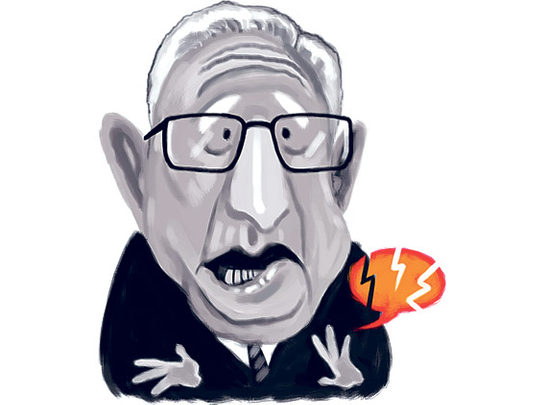
In an article published recently in the Washington Post, former US secretary of state Henry Kissinger reminded his readers that his analysis on Iraq has been correct all the way through.
Referring chiefly to an address he made before the Council on Foreign Relations in 2005, the former head of US diplomacy and a key supporter of the Iraq war was very critical of former president George W. Bush's attempts to "establish a flourishing democracy" in Iraq. In the address, which was published on the website of the prestigious US think tank, Dr. Kissinger mocked the idea that the US can democratise the Arab country or deal with it in the same way post-war Germany or Japan were dealt with.
For the once architect of US diplomacy the analogy which was made in the run-up to the war between Iraq and the two non-Arab countries was overtly mistaken. Germany and Japan were countries which have a coherent national structure and a coherent national history. They were countries that felt they had been defeated and therefore needed a new approach. Iraq, by contrast, was nothing like that. And for this reason, Kissinger argued, "I preferred an approach, which [was at the time] decried, of trying to get somebody to surrender and establish a government, and then creating some sort of UN structure, in which UN forces could protect the borders and help this government in a crisis, rather than assuming full responsibility for rebuilding the country as a democracy".
In 2005, Dr. Kissinger says, he was not only pessimistic about the prospect of establishing democracy in Iraq but also feared the emergence of a radical, theocratic government in Baghdad as a result of the democratic process. Had that happened, Kissinger argues, the consequence would have been earth-shaking. "The radical side of Islam will get tremendous impetus in every Islamic country. And I don't know any leader of any country that has a large Islamic minority, or is Islamic like Indonesia or Malaysia, that would not be grievously affected by an American defeat as I have defined it in Iraq".
Kissinger pretends that he was not against democracy per se but believed, just like many other like-minded thinkers; that democracy was not for everyone. "I support the concept, I support the attitude, but we should keep in mind that we also support stability. It's difficult to apply this in every country".
To solidify this argument, he cites Iran as an example, where he believes democracy and stability are incompatible. Historically, he argued, attempts to force-feed democracy in the Carter administration produced Ayatollah Khomeini.
Indeed, Kissinger tends to forget that the very logic he advocated five years ago on Iraq had cost America Iran and earned it animosity that is still amazingly alive. In fact, Kissinger was outside the power circles during the course of the Iranian revolution. But his sympathisers presented Carter with exactly the same argument.
At the time, two factions were competing for formulating US policy on Iran: the State Department, which recommend accepting the change in Iran and recognising the revolution. The other faction was represented by the National Security Council (NSC) and advocated supporting the Shah to the last drop of Iranian blood. Hardliner Kissingerists of the NSC held the argument that at the heart of US-Iranian relations lay deep cultural antagonism. The relation symbolised a confrontation between two world models and two different cultures: Khomeini's theocratic Islam and America's secular-democratic concepts. For them, America had no choice but to win this civilisational conflict by preventing Iran from going Islamic even if the means was democratic. This policy ended up in losing both the Shah and Iran and resulted in dire consequences for the US.
Today, Dr. Kissinger does not seem to be concerned about attempts to democratise Iraq because there is not any. To his comfort, democracy promotion is President Obama's last priority. Yet, the old US diplomat is not satisfied. His major take on the Obama administration's Iraq policy is that it focuses on withdrawal regardless of the consequence. Instead, Kissinger believes, Obama should be concentrating on protecting US strategic interests in the region by rebuilding the Iraq-Iran balance of power. Once again, Mr Diplomacy tends to forget that by supporting the ousting of Saddam Husain he made a major contribution to destroying the same balance he advocates today!
Dr Marwan Al Kabalan is a lecturer in media and international relations at Damascus University's Faculty of Political Science and Media in Syria.









